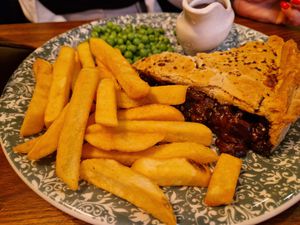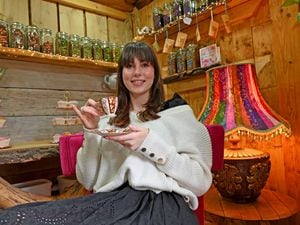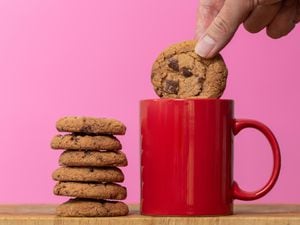What’s brewing: Inside the home of Wolverhampton-based Shropshire Coffee
There is nothing quite like the smell of freshly brewed coffee.
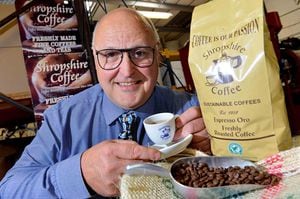
In the UK, we now drink approximately 55 million cups of the stuff each day.
Once a nation of tea lovers, it seems more and more of us are getting taste for cappuccinos, lattes and Americanos when we go out.
While many of us have stuck with instant coffee at home, there has been a steady rise in sales of ground coffee and single-serving pods, especially among the younger generations.
Someone who certainly knows his arabica beans from his robusta is Sicilian master roaster Giuseppe D’Anna who is keeping his family business alive.
His company was founded by his father Leonardo D'Anna, who had originally come to England from Sicily to be a coal miner, in Wolverhampton in 1958.
It actually began life as a mobile shop supplying the local Italian and Polish community with all types of food, wines and, of course, coffee.
Later, Leonardo opened a delicatessen in Bushbury Lane and soon expanded further to have a fleet of mobile shops.
Today, the company, now named Shropshire Coffee thanks to being based in Bridgnorth for a short period, specialises in roasting coffee and produces espresso,cafetière and filter blends.
From its premises on Fordhouse Road Industrial Estate it also supplies customers with everything from machines to chocolate sprinkles.
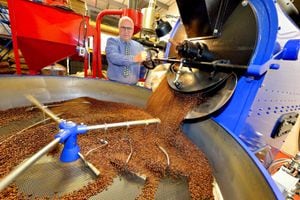
Giuseppe, who left his position as a research chemist to join the family firm in 1986, is now joined by a team which includes his daughter Nina, aged 37, and Emma Hewes, 42, who both run the office as well as Matt Powis, 26, an apprentice roaster.
The first thing tells us Giuseppe when Weekend arrives to find out more about what goes into producing one of our favourite drinks is not to expect that recognisable aroma to fill the air.
"When you roast coffee, it doesn't smell like coffee at all. It smells like bread or toast. When we first moved to our site 20 years ago, we had people asking where the new bakery was," he explains.
Hessian sacks full to the brim with beans arrive once a fortnight from all over Central America and South America along with others from Africa, Asia and India.
"The first thing we have to do is to check the quality. We want to make sure the beans are fresh, clean and don't have any mould or weevil holes.
"We do what some people call the 'stink test'. We rub a bean across some sandpaper and if it's fresh and dried properly there will be what we describe as a green smell.
"But if the smell is not very nice, and you can tell straight away, we know it's not a good batch. Thankfully, the producers we buy from are very good and that hasn't happened for a very long time but we still have to check," explains the 63-year-old.
Next the beans, which come from farms that meet Fairtrade and Rainforest Alliance sustainability standards, are ready for the roaster, which can process 60kg every 18 minutes.
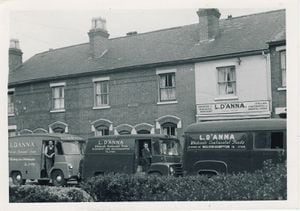
"We believe it's important to support coffee growers by buying coffee that has been purchased directly from farms that meet Fairtrade and Rainforest Alliance sustainability standards. We also know then that the farmers are getting a good price for their produce," says Giuseppe.
The next step in the process sees the beans tipped into the hopper and then vacuumed up into the into the roasting chamber.
Arabica beans are roasted at between 215c (419F) and 216c (420F) and robusta ones, which have a higher caffeine content, at a temperature of 220c (428F).
When they have reached the desired temperature and colour they are then poured into the cooler to stop the roasting process.
Once they have cooled, which only takes around five minutes thanks to the fan, they will be put into the destoner to get rid of all the foreign bodies that might still be present.
A sample will then be tested by the roasters and if they are happy, the are then left to settle and degas for around five days to allow the full flavours to develop. Once this is complete they are ready for the grinder and the first cup of coffee can be made.
Blends tend to be made up 70 per cent arabica and 30 per cent robusta with beans coming from a vast range of countries including Brazil, Peru, Columbia, Guatemala, Ethiopia and Vietnam.
Each week around two and a half tonnes of coffee is roasted with the equivalent of 450,000 cups of coffee leaving the premises bound for cafes, restaurants and other businesses.
The Shropshire Coffee brand is supplied to companies within a 60-mile radius of Wolverhampton while they also have the D'Anna Fine Coffee brand known across the country from Aberdeen to Wembley Stadium.
For Giuseppe, there is no better job. "Roasting coffee is definitely something you grow up with rather than stumble into.
"I remember Dad getting a small roaster to begin with and helping him with the roasting on a Saturday. It's wonderful to know we are still doing it all these years later," he says.
"Coffee is the elixir of life - it gives us energy, it helps us focus and has many health benefits. It also tastes and smells good too," adds Giuseppe.
But he says there is more to a good cup of coffee than just the bean - and he should know. He gets through 20 cups of coffee a day during the working work but admits to 'detoxing' at the weekend when he halves his intake to 10 cups.
"Firstly, you need a good quality bean but that alone doesn't guarantee you a good cup of coffee. You need to make it in a machine that is kept clean and you must use decent, filtered water.
"The coffee needs to be brewed at 92c. If you get all of that right, then you should have a very good cup of coffee" explains Giuseppe.

